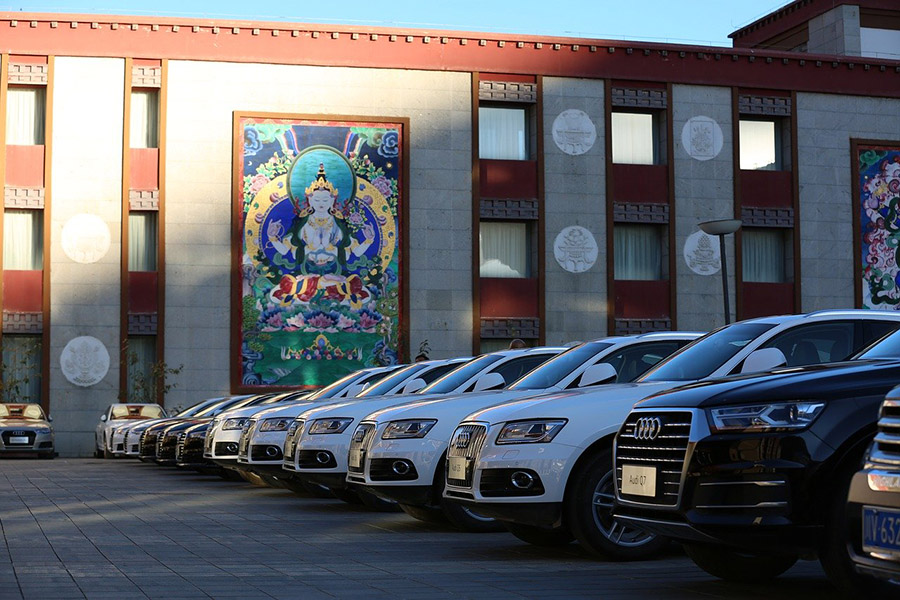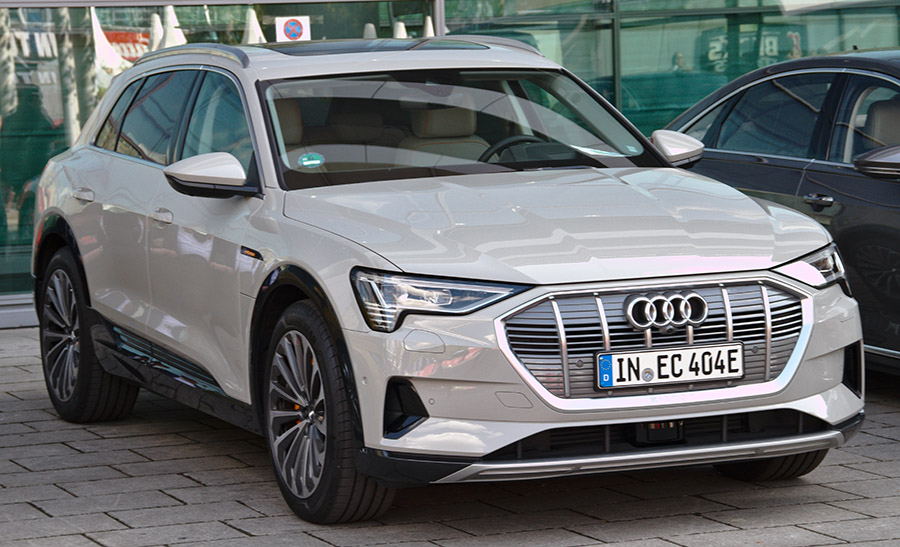In the U.S., German automakers rule the luxury market. But among them, Audi looks at first like an absolute laggard. The four rings sold 224,111 new vehicles in the United States in 2019. Far behind, BMW’s 324,826 and Mercedes-Benz’s 357 ,729. But a closer look at history tells a bit of a different story.

A premium brand owned by German automotive colossus Volkswagen, Audi had for much of its history been a kind of also ran in luxury. So Audi has been kind of like the other German automaker. Everyone’s super familiar with BMW and Mercedes-Benz.
Over its history, Audi has gone from being a scandal ridden name no one wanted to touch, to a fearsome competitor that had about a decade of solid sales growth in the United States. It became a brand of choice among young buyers seeking a sleek, tech savvy luxury car brand they could call their own. However, that streak has broken and Audi management has acknowledged slumping sales, compliance concerns, and continued fallout from the diesel cheating scandal that rocked Audi’s parent Volkswagen, o ne of the world’s largest automakers. Now Audi is trying to get the magic back.
The Story of Audi
Unintended acceleration
The modern Audi story starts with a scandal. The brand faced severe scrutiny and criticism in the late 1980s over a spate of reports saying the brand’s Audi 5000 model was unintentionally accelerating. As with some other unintended acceleration scandals facing other automakers such as Toyota. Research since then has cast doubt on the claim that unintended acceleration was caused by equipment problems in the cars.
Safety concerns
Nevertheless, at the time, the case did serious damage to the Audi brand with image and safety conscious baby-boomers. Audi sales reportedly cratered 84 percent between 1985 and 1991, at one point hitting sales of just 12,000 vehicles a year. Of course, at the time, there was also a larger recession in the U.S. economy.

But as bad as the scandal was, it may have created an opportunity for the brand that later contributed to its growth. And it seemed like it really kind of rode the wave of the German luxury brands, and trying to capture that person that had money to spend obviously, but didn’t necessarily want a BMW or a Mercedes because those were seen as kind of the old guard, particularly Mercedes.
Millennials love Audi
So I think that Audi kind of was up and comer. Yet still German luxury brand that people turn to in those times. The fallout from the scandal turned Audi into a somewhat obscure brand, but its obscurity gave it a kind of freshness and allowed it to connect with a new generation of buyers who didn’t associate Audi with their parents.
As BMW and Mercedes battled each other for the title of top luxury brand in the U.S. and around the world. Upstart Audi had the advantage of looking a bit less established. You had the millennials, the oldest millennials, who I call the trophy generation. You had them just starting to come into luxury, just starting to come into peak earning years, just starting to say, I’m going to treat myself and I’m going to get a luxury vehicle. And by the way, I want one that my parents didn’t drive.
The brand reinforced this youthful image through its marketing and it gained attention as a car of choice for celebrities at the time. Relative to BMW and relative to Mercedes-Benz, the Audi, the emerging Audi customer was a lot younger. They were very affluent at a younger age than than BMW Mercedes customers, which meant that there was a lot of upside potential in getting these people into the brand, because as time would go by, you can move these people up into yet more expensive products in the Audi portfolio.
Jump in popularity
Audi’s popularity skyrocketed, annual sales grew 161 percent from 2002 to 2019. Compare that to BMW, which grew 40 percent, and Mercedes, which grew 67 percent in the same time. But it wasn’t just its newness that resonated with customers.
Quattro AWD
Audi gained a reputation as an innovator in design, especially when it comes to including new technology and its cars. Of course, the brand has long been well-known for its Quattro all wheel drive system, which many regard as one of the top such systems on the market.

While Mercedes and BMW specialized mostly in rear wheel drive models, Audi served customers increasingly interested in the advantages of delivering power to all four wheels for better control in snow and rain and light road driving.
Product portfolio overhaul
But the brand also overhauled its product portfolio and released some attention grabbing vehicles to show off its engineering and design prowess. Over the years, because they’ve had that connection with Volkswagen, they’ve been struggling to try to make themselves known as something more than just a luxury version of a Volkswagen.
Audi R8
And in later years, they have accomplished that. In 2006, it released the first Audi R8, a mid-engine sports car with a six figure price tag that acted as a kind of halo for the brand. The Audi R8 was the first production vehicle to have LED headlamps. That may seem like a trivial detail, but it made a big impression.

Technology
Audi also got special recognition for its interiors, a key strength in the luxury market, and it became strong in tech. Two areas where Audi has stood out in particular are semi-autonomous driving features and infotainment systems.
Audi has become a real leader in the technology space. You know, a lot of the really innovative infotainment and semi-autonomous technologies have been viewed as Audi products. And certainly that has made the brand very appealing and very relevant to younger luxury customers.

Audi is regarded as something of a pioneer in integrating technology into its vehicles. And therefore, some say it may have something of a lead over other manufacturers when it comes to embedding. Sometimes buggy and difficult new features in its cars. So far, the brand has managed to retain its youthful appeal.
The slowdown
To this day, Audi customers definitely remain younger than BMW and Mercedes-Benz customers. And that’s a pretty enviable position for the company to be in. But in recent years, Audi around the world has shown signs of slowing down, even stumbling. And it has faced a challenging market conditions in China, as well as headwinds from new emissions regulations in Europe.
In the U.S., the brand enjoyed an incredible streak of more than 100 months of year over year sales increases from November 2009 to October 2018. Its first month of falling sales in a decade came in November of 2018.

Worldwide, the brand also hit the skids after years of solid growth, Audi global sales fell 3.5 percent in 2018. At the time, Audi attributed the drop to challenging market conditions and difficulties presented by Europe’s switch to the worldwide harmonized light vehicle test procedure, a new standard for regulating emissions.
The recovery
In 2019, global sales recovered and rose 1.8 percent. That outpaced Mercedes in terms of growth, but was behind BMW. Though over the long term Audi has grown tremendously, in recent years, it has actually trailed its German rivals.
Audi has pointed out that the last three months of 2019 were its best fourth quarter on record for the U.S. and that it did outpace both Mercedes and Lexus in year over year growth in the U.S. in 2019.
After years of cultivating an image as a cutting edge, youthful and almost insurgent luxury brand, Audi has, in the eyes of many consumers, become another established brand.

Originally that buyer was a lot like that BMW buyer or the Mercedes buyer that wanted something different. They didn’t want to be that stereotypical BMW buyer, but still wanted that German luxury experience. And I think that that has been great for them.
But now, 15 or so years later. It’s also becoming a little bit of a detriment to them, because now they are becoming mainstream. Some industry watchers have also seen the brand falter slightly on other metrics.
Over the last decade, Consumer Reports has several times ranked Audi as a top brand for reliability, often ahead of its German rivals and even in front of Japanese brands famous for their dependability. But the latest data Consumer Reports is collecting suggests Audi has been struggling on reliability recently. We’ve seen something change there. And that is attributed to some of the changes that they’ve made.
There is a new infotainment system, a new electronics, a new power trains that they’re launching. And they do appear to have seen some struggles with those where they’re no longer a top five automobile in terms of reliability anymore. There is just a lot more competition which is pushing all automakers to raise their game.
Audi, to address issues highlighted by quality measurement groups such as Consumer Reports, attributed its recent fall in rankings to a large number of all new vehicles it released between September of 2018 and March of 2019. Throughout 2020, it expects to rise in reliability rankings.
So a lot of the things that made Audi exceptional, its unique all wheel drive system, its abundance of technology have been adopted by competitors, even mainstream brands at lower price points. Buyers who may not need a German logo on the hood can save a lot of money by shopping elsewhere.
Electrification of fleet
Now that Audi has become something of an established brand, it is faced with having to decide how it continues to compete and grow its customer base. Audi parent Volkswagen is planning big investments in electric cars, and the Audi brand has already released a closely watched electric sports utility vehicle called the e-tron.

Audi has said it plans to invest roughly $16 billion through 2023 in electric cars, digital services and autonomous driving. By 2025, the Audi portfolio will already include more than 30 models with some kind of electric drive. Of those, 20 will be fully electric vehicles the company has said.
Audi vs Tesla
The question is, can Audi maintain its youthful tech forward image in an increasingly electric era, when there is a new brand on the scene, which seems to have already carved out that niche… Tesla.
Some industry watchers note that in terms of sales, Tesla seems to control the electric car market and interest in so-called Tesla-killers from rival firms has been limited. The e-tron sold 5,369 units in the U.S. in 2019. That’s less than half of the roughly 13,250 Tesla Model X, now several years old, that starts at a similar price as the e-tron. Of course, the e-tron was only on sale from May to December.
A bit more concerning is the lead. Tesla seems to have over competitors in battery technology and the superior range available on its cars. Range anxiety is still a huge issue for many would-be electric car buyers. The e-tron gets far less range than a model X, 204 miles on a single charge, compared with 328 miles per charge on the Tesla’s long range version.
Audi says it has a strong commitment to electric vehicles and noted that it will be releasing new versions of the e-tron in coming years. The other challenge for Audi and really many incumbent luxury carmakers is the kind of brand power Tesla has.

Tesla is a tech forward brand with sleek design that appeals to a younger audience. All attributes. Audi has been known for throughout its heyday. It almost feels as if Tesla has taken that from a lot of these luxury automakers and has taken that idea. This is the pinnacle of aspiration.
Audi has mastered certain elements of the luxury vehicle game that some industry watchers say make it a formidable rival, even for the likes of a much buzzed about upstart like Tesla. The other thing that they really continue to excel at and this is something that Tesla’s still lack is really, really excellent build quality. You get inside an Audi and these interiors are just incredible.

Perhaps Audi’s strongest weapon is its decades of experience competing with some of the most formidable brands in the luxury car business?









